2017 N.A. Automotive OEM Study Shows General Motors Jumps to Third Place, Nissan falls to last, in Supplier Relations
DETROIT, May 15, 2017 /PRNewswire/ -- General Motors is doing many things right these days, including improving its supplier relations.
Results of the 17th annual North American Automotive OEM - Supplier Working Relations Index® Study released today shows that GM has jumped to third place – its highest level ever in the history of the study -- ahead of Fiat-Chrysler US, Ford and Nissan, which now is in last place. Nissan's supplier relations have dropped for the third straight year since 2014 when it was in third place.
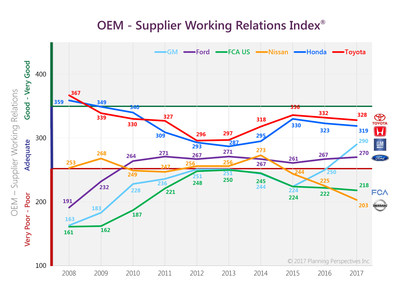
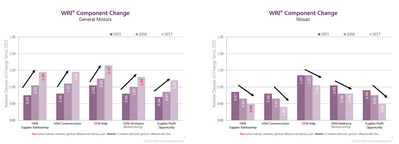
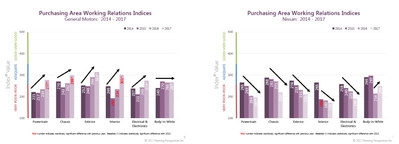
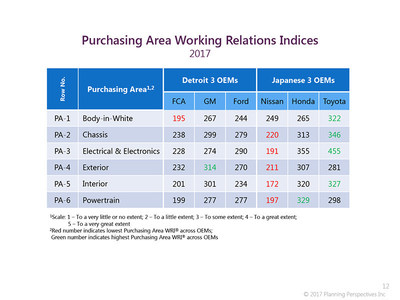
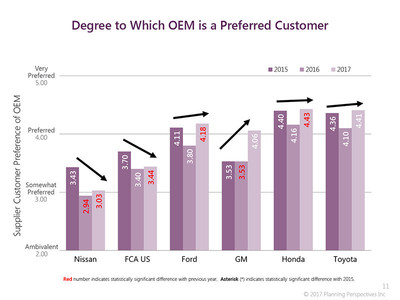
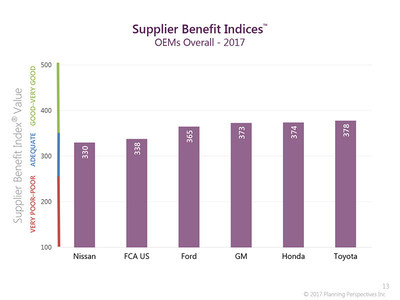
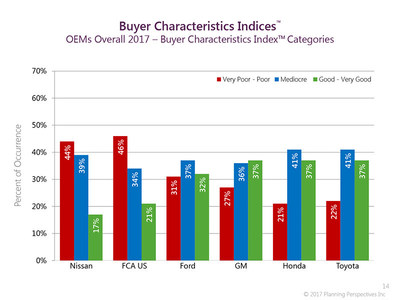
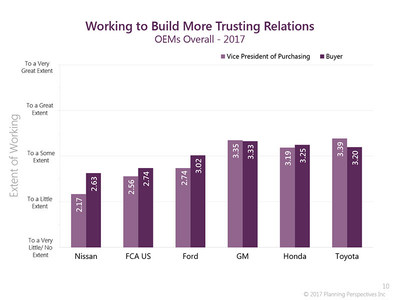
Ford, in spite of a slight improvement this year, is now ranked fourth. Fiat-Chrysler continues its downward slide, but is in fifth place because of Nissan's poor performance. Toyota and Honda still hold first and second place, respectively, while continuing their slow downward slide in the annual rankings.
The study is watched carefully by automakers because their supplier relations rating is highly correlated to the benefits the OEM receives from its suppliers – including new technology, lower pricing, and best supplier support – all of which contribute to the OEM's operating profit and competitive strength.
"GM's turnaround in supplier relations is remarkable," said John Henke, president of Planning Perspectives, Inc., which conducts the annual study, "and the reason for their dramatic improvement – and Nissan's fall -- is easy to understand.
"GM has improved across the board in all five of the key areas that comprise the Working Relations Index® ranking, and Nissan has dropped in all five. While both companies have had significant cost-cutting programs in place for the last two years, their programs have had opposite results in terms of supplier relations. Nissan's adversarial approach to reducing cost has greatly disrupted relations with its suppliers and it is safe to say that it has cost them tens of millions of dollars in supplier contribution to profits."
The Working Relations Index® scores automakers on 16 variables, which fall into five broad areas: OEM Supplier Relationship, OEM Communication, OEM Help, OEM Hindrance (reverse measure), and Supplier Profit Opportunity.
Of the other four automakers, Ford's WRI® ranking improved slightly with small gains in Supplier Relationship, Communication, and Hindrance, but it declined in OEM Help. FCA declined in Communication and Help, and was flat in the other three areas. Honda dropped slightly in Communication and significantly in Help, but improved slightly in Hindrance. And Toyota improved in Communication and Supplier Profit Opportunity, improved only slightly in Hindrance, but fell in Help.
The significant differences between GM and Nissan extends down to their respective purchasing areas. For the purposes of the annual Working Relations Study, an automaker's purchasing function is broken into six areas: body-in-white, chassis, electrical/electronics, exterior, interior and powertrain.
Here again the scoring is consistent. GM improved in five of the six Purchasing Areas, while Nissan fell in five of the six.
Of the other four automakers, Honda had steep declines in body-in-white and exterior, a slight decline in chassis and was flat in the other three. Toyota had a significant improvement in electrical/electronics and a small gain in powertrain, while dropping in the four other areas. Ford fell in powertrain, chassis, and interior; had a slight gain in body-in-white; and significant gains in exterior and electrical/electronics. FCA dropped in body-in-white, powertrain and interior; had significant improvement in electrical/electronics; and some improvement in chassis and exterior.
Comparing the six automakers' Purchasing Area scores for 2017, Toyota is the clear leader with the highest ranking in four of the six Areas: body-in-white, chassis, electrical/electronics and interior; Honda leads in powertrain; and GM was tops in exterior. Nissan was the lowest in five of the six Areas, and FCA, lowest in one. (See table. Green is highest; red, lowest.).
Preferred Customers
Another indicator of an OEMs' supplier relations is the degree to which each automaker is considered a preferred customer. This year, Ford, GM, Honda and Toyota all registered significant gains in this category, while Nissan and FCA remained relatively flat. According to the study, Honda continues to be the most preferred customer for the last three years – significantly more so than all other OEMs except Toyota, and Nissan the least preferred.
Benefits of Good Supplier Relations
Henke's supplier relations research has established that the more collaborative the supplier relations, the greater the supplier benefits received by the automaker. These benefits include more supplier sharing of innovation; greater price concessions; more supplier investment in OEM-related innovation; and greater supplier support; among others. Again, GM's and Nissan's scores this year illustrate this fact. The supplier benefit indices graph below indicates a supplier propensity to share new technology and other benefits.
Nissan, with a benefit score of only 330, is significantly behind Ford (365), GM (373), Honda (374) and Toyota (378). Ford is alone in the middle, significantly above Nissan and FCA, but below the other three OEMs.
Buyers Hold the Key
To be effective, automakers' efforts to improvement supplier relations must have the support of top management, with the goal understood and reinforced down to the automakers' Buyers, or nothing will change.
"Every few years, an automaker will come up with some new program aimed at improving their supplier relations – but they rarely have a lasting effect," says Henke. "The reason is quite simple: Supplier relations start at the top, but must be driven down to the Buyers – and effectively reinforced -- to get the Buyers to change their behavior with supplier salespeople. Such an effort must be part of the corporate culture. Buyers will not change their behavior unless improving supplier relations is part of their performance measures."
The study asked suppliers to rate the automakers on having Buyers who are considered the most fair, equitable, knowledgeable, and trusted. The data shows that GM, Toyota and Honda have more highly rated Buyers (green bar) than Ford, and significantly more than Nissan and FCA. Whereas the percent of poorly rated buyers (red bar), Nissan and FCA score highest, or worst. In the "Good to Very Good" category, Honda and Toyota are virtually tied.
Purchasing VPs
How Buyers perform is a direct reflection on management all the way up to the vice president of purchasing. How involved the head of purchasing is with his or her staff, how well performance standards are implemented and monitored, and how committed management is to improving supplier relations, plays a major role in improving supplier relations.
A major factor in this score is the trust. As in any relationship, trust is the foundation upon which every relations-related activity is built. Both the Purchasing VP and Buyers must be committed to this effort – and perceived to be working together to build trusting relations with their suppliers.
The graph below shows the extent to which Head of Purchasing and Buyers at each OEM are perceived to be working to build trusting relations. The team at GM and Honda are working together very well; however, Nissan's Purchasing VP and its Buyers appear to be at odds with one another.
"With the increasing complexity and competitive challenges facing the automotive industry in terms of technology, vehicle types, new forms of vehicle ownership and use, and new players entering the market, the OEMs are going to have to work even more closely with their suppliers to maintain their marketplace competitive advantages. That's why automakers need to focus on developing more collaborative relations with suppliers – the OEMs need to work on becoming better trusted, more collaborative partners.
"General Motors has made great strides in this effort over the past two years, but neither they nor the other OEMs can slow down in this effort given the industry's increasing challenges," said Henke.
About the Study: Now in its 17th year, the Annual North American Automotive OEM-Tier 1 Supplier Working Relations Index® Study tracks supplier perceptions of working relations with their automaker customers in which they rate the US and Japanese automakers across the six major purchasing areas broken down into 14 commodity areas. The results of the study are used to calculate the WRI® which can then be used to calculate the economic value of working relations based on a proprietary PPI-developed economic model. The annual WRI® study is i recognized as the benchmark of supplier working relations for the automotive industry and has been discussed in numerous academic research journals, including the Harvard Business Review, and several books. This year, 652 sales persons from 108 Tier 1 suppliers, representing 64% of the six OEMs' annual buy, participated in the Study. The sales personnel provided data on 1,974 buying situations (e.g., supplying brake systems to FCA US, tires to Toyota, seats to GM). Demographically, the supplier-respondents represent 40 of the Top 50 NA suppliers and 68 of the Top 100 NA suppliers.
About PPI: Since 1990, PPI has specialized in developing and implementing supplier surveys for the automotive OEMs and Tier 1 suppliers, and companies in 17 other service and manufacturing industries worldwide, including the airframe, aircraft engine, computer, construction tool, electronics, energy, and food industries. In 2001, PPI initiated its syndicated annual North American Automotive OEM - Supplier Working Relations Index® Study of the Big Six US and Japanese automakers and in 2010 began tracking the US-based German automakers as well. In 2011, PPI added a financial-impact study that quantified the profits associated with the OEM supplier relations.
John W. Henke, Jr., Ph.D., is president of Planning Perspectives, Inc., is a Professor Emeritus of Marketing at Oakland University in Rochester, MI, and is a Research Fellow at The Center for Supply Chain Management, Rutgers University, New Brunswick, NJ. He is based in Birmingham, Michigan USA and can be reached at +1.248.644.7690. Visit PPI at www.ppi1.com.
SOURCE Planning Perspectives, Inc.
Related Links
WANT YOUR COMPANY'S NEWS FEATURED ON PRNEWSWIRE.COM?
Newsrooms &
Influencers
Digital Media
Outlets
Journalists
Opted In
Share this article